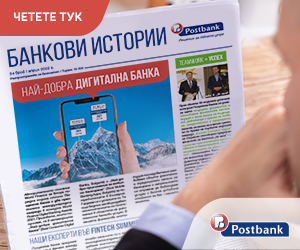Petia Dimitrova: Digitalization has set even more ambitious goals for us for the future
28 September 2021
An interview with Petia Dimitrova for Economy.bg
Ms. Dimitrova, Postbank celebrates its 30th anniversary in 2021. What is the conclusion for this period?
Throughout these years Postbank has proven to be one of the most successful systemic banks in Bulgaria. The numerical expression of success shows that we rank third in terms of loan portfolio and we are the fourth largest bank in Bulgaria in terms of assets and size of deposits, with over ten percent market share, over 200 branches across the country and more than 100 awards won for our digital innovations and products, services and social responsibility policies.
It is no coincidence that the Bulgarian Credit Rating Agency (BCRA) upgraded Postbank’s Long-Term Rating from BBB- to BBB, while maintaining a short-term rating of A-3, and at the same time changed the outlook from “positive” to “stable”.
But this is primarily from a statistical point of view. For us, the far more important indicator is that we have naturally become a trusted partner, employer and socially responsible company. Moreover, we have established ourselves as an institution that customers trust and that offers them solutions for their tomorrow. This would not have been possible without the efforts of our entire team. That is why I want to thank all my colleagues, clients, shareholders and the strong international group to which Postbank belongs.
How did you work in the pandemic and what model of work will you follow in the future?
Everything that has happened to us in the past year and a half has created many challenges for all of us, as it was a genuine and real test of our ability to respond adequately to a change, the scale of which cannot be easily predicted and controlled. That time allowed us to get to know the situation in which we live and to effectively organize the internal work processes. We introduced a systematic rotation of teams and this helped us keep the relationship with the office alive and uninterrupted.
Although we were physically separated, we remained digitally connected by implementing the Digital Office application for quick and easy internal communication with our employees, thus investing in the sustainable care of each member of our team. We have eased the daily life of the employees and improved the communication between them; we have managed the internal processes in the bank even more easily and efficiently. We have made the office meet the needs and expectations of each of the colleagues – whether this office is physical or digital.
How do you see the bank of the future? Is there a place for the banking branch in the digital world?
The future of banking is undoubtedly digital, with more advantages, conveniences for our customers, providing the most important thing – speed of service, which saves time for consumers.
Guided by this idea and corporate philosophy, we offered our customers our unique mobile wallet of a new generation ONE Wallet, which offers the consumers even more banking services through their phone. It practically gives them instant contactless access to basic banking services because they transfer the physical wallet to their mobile phone. They can add all their bank cards and manage them freely and efficiently thanks to the rich set of functionalities that are built in the application. Among them are contactless payment with the phone at a POS terminal, card management in a mobile wallet such as setting limits for different channels (POS, ATM, online payment), opportunities to add loyalty cards from different merchants, vouchers for discounts at our partners and many others.
But the physical bank branch does not only have its place – it will be completely innovative. At Postbank we successfully developed the concept for our digital express banking zones, which were immediately recognized as a preferred alternative to one-stop-shop banking. Thanks to the intuitive devices in these areas, our customers can easily and quickly perform most of the basic banking operations themselves, once they identify themselves only with their debit or credit card, without the need to be registered for the bank’s internet banking. The digital zones are already operating in 74 branches in 34 cities in the country and the opening of more locations and upgrading of the service is forthcoming.
Although we digitize processes, products and services, we will not take away the most important thing for our customers – the personal attitude in the face-to-face interaction. Their needs are of paramount importance to us and that is why we will continue to offer them new solutions for managing their finances.
What are the leading trends that are transforming banking at the moment?
At the moment, our focus is on immediate payments, which allow money to be transferred to a counterparty within seconds. Postbank, together with BORICA, is working very hard on the introduction of this product and we expect it to become available to our customers in the coming months. As part of our developed digital channels, instant payments can be an alternative to both card payments and shopping in a physical store.
How do banks respond to the challenges that fintech companies present: by cooperating with them, investing in them, acquiring them, competing with them, or by developing their own models?
All of the above. There are many different types of fintech companies, some of which want to be direct competitors of banks, while others seek active cooperation with them.
The difference between a fintech company and a typical commercial bank is that the former focuses on a product or service, while banks offer a comprehensive service – we offer many services to the full range of customers – both online and offline. Consumers will continue to prefer banks as a place to store their financial resources, as they recognize us as their reliable partner, largely due to the fact that we are highly regulated. Regulations ultimately mean security and stability, and that is no less important to customers.
Clients do not expect us to be a fintech company, but to be an even better bank and this is the strategy we follow and we are especially active in its implementation now that it is clear that the world is digital. Technology is the tool, but it is not a solution to all the expectations and needs of consumers.
What is the future of money? Is the end of cash coming and what will be the role of digital currencies?
Cash is still the preferred means of payment in our country, although in recent years the share of electronic payments has been growing at a steady pace. Over time, however, cash will lose its significance, and people will increasingly appreciate the convenience of electronic money. In this respect, the share of cash payments in the most advanced countries is now less than ten percent of all payments and there is already talk of completely cashless societies.
This naturally makes people wonder if digital currencies will replace electronic money and, above all, which technology will be adopted – that of decentralized cryptocurrencies or central bank money.
For commercial banks, decentralized cryptocurrencies are an area that we are paying close attention to, because, as I have pointed out, we are a highly regulated business and there are many issues that need to be taken into account, especially with regard to anti-money laundering measures.
On the other hand, the idea of central bank money is gaining momentum. Many central banks around the world are currently discussing this or conducting experiments. The European Central Bank (ECB) launched a project to create a digital euro in the middle of this year.
The ECB has indicated that it does not plan to completely replace physical money, but sees the virtual euro as an alternative form of payment and investment to complement the role of banknotes and coins.
For us, the positive is blockchain technology, which can have a very wide field of applicability in the banking business in various processes such as optimization and cost reduction, so we see the future more in technology than in cryptocurrencies themselves.
Postbank is one of the banks that stopped opening and maintaining deposits. Where is it profitable to keep our money during a crisis?
Before I answer, let me correct you – not only have we not stopped maintaining deposits, but we continue to offer deposit products to our customers.
Banks remain the safest place to store consumers’ money, and they are well aware of this. The BNB data confirm that the savings of companies and households continue to grow at a record pace this year as well.
Mutual funds and structured deposits are an alternative to bank deposits, as Postbank offers very profitable products in both categories.
This year we developed and launched another innovative deposit product – Structured Deposit Index Climate Change in EUR, aimed at customers who are looking for additional solutions for their savings. Our latest deposit solution is offered in euro for 72 months, with guaranteed principal and the possibility of profitability, which is tied to the presentation of an index – Solactive Climate Change Europe BTI PR Index. Compared to the current standard term deposits, Index Climate Change in Euro is an alternative to an investment with the possibility of receiving a return.
In addition, we can offer our clients investments in a variety of mutual funds, according to their investor profile and risk appetite.
In its latest report, the BNB forecast an increase in the share of non-performing loans in banks’ portfolios and a moderate rise in interest rates on new loans in the second half of 2021. What are your expectations?
The moratorium on bank loan payments has helped many borrowers not to fall into arrears and to continue repaying their loans regularly. The application deadline was the end of March, with the maximum deadline being the end of this year.
Most of the loans subject to the moratorium in the bank are already out of their grace period and have returned to their standard repayment plans. Our observations so far are that the quality of this portfolio is very good, which shows that the moratorium has met its objectives and prevented a potentially systemic problem.
Of course, the pandemic is not over yet, and we are therefore closely monitoring customer behavior and are ready to respond and help if we notice that some of them are experiencing difficulties.
What is your forecast for the development of the economy in our country in view of the new covid wave?
I am optimistic about the development of the economy for this and next year. Our expectation is that the country’s GDP will grow by 4.5 percent this year and by about 4.2 percent next year. The expectations of the European Commission and many other analysts, who predict economic growth of over four percent for this and next year, are similar.
In the last few months, we have seen a strong recovery in the economy and an improvement in macroeconomic indicators. GDP growth for the second quarter of the year amounted to 6.4 percent, with all components growing at a very high rate. Unemployment is record low, the summer tourist season was better than last year’s, the country’s exports are at their highest, and budget revenues are higher than planned.
The main risk to the country’s economy is not so much the new COVID wave itself, but rather the low percentage of vaccinated people in the country. A sharp increase in the number of infected will lead to the imposition of new restrictions, which will mainly affect the sectors that were most severely affected by the pandemic – tourism, catering, entertainment. Fortunately, many companies have shown that they can adapt to the new reality and work relatively successfully remotely or in the face of imposed restrictions, which leads me to believe that this wave will not have a significant negative effect on the economy.
How will the adoption of the euro affect Bulgaria?
The process of our country’s accession to the eurozone is the most important for Bulgaria in the coming years. Let me remind you that in July 2020 our country was accepted as a member of the ERM II exchange rate mechanism and the banking union as part of the preparations for joining the euro area. And two months ago, the Coordination Council for Preparation for Euro Area Membership adopted a draft National Plan for the introduction of the euro, and good practices from the euro area member states were followed in its preparation.
When it comes to our accession to the euro area and the adoption of the euro as a national currency, I think we are all looking in the same direction and working together. We have a roadmap outlining the activities and processes that participants in preparation for the introduction of the euro – the private, public sector and citizens – should carry out as part of the process of adopting the euro.
I do not think that there will be a big change or a long period of adaptation for the Bulgarian society, as we are already accustomed in one way or another to the euro as a currency, in the context of the “currency board”.
This is a real opportunity for our country to be part, figuratively speaking, of the club of rich countries, and this is a result of positive changes, unification of the rules and additional transparency.
It is expected that the euro will lead to acceleration of the real convergence of the national economy with the eurozone, higher confidence of foreign investors and as a whole – faster economic development, better integration, improving the trade and competition conditions. This is an important prerequisite for raising income and increasing optimism among businesses and consumers.











